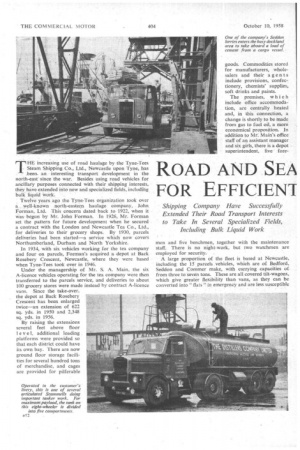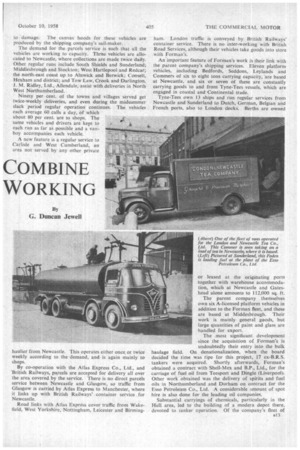ROAD AND SEA FOR EFFICIENT COMBINE WORKING
Page 46

Page 47

Page 48

If you've noticed an error in this article please click here to report it so we can fix it.
By
G. Duncan Jewell
Shipping Company Have Successfully Extended Their Road Transport Interests to Take In Several Specialized Fields, Including Bulk Liquid Work
THE increasing use of road haulage by the Tyne-Tees , Steam Shipping Co., Ltd., Newcastle upon Tyne, has .been. an interesting transport development in the north-east since the war. Besides using road vehicles for ancillary purposes connected With their shipping interests, they have extended into new and specialized fields, including
bulk liquid work. .
Twelve years ago the Tyne-Tees organization took over a , well-known north-eastern haulage company, John Forman, Ltd. This concern dated back to 1922, when it was begun by Mr. John Forman. In 1926, Mr. Forman set the pattern for future development when he secured.. a contract with the London and Newcastle Tea Co., Ltd., for deliveries to their grocery shops. By 1930, parcels deliveries had been started—a service which now covers Northumberland, Durham and North Yorkshire.
In 1934, with six vehicles working for the tea company and four on parcels, Forman's acquired a depot at Back Rosebery Crescent, Newcastle, where they were based when Tyne-Tees took over in 1946.
Under the managership of Mr. S. A. Main, the six A-licence vehicles operating for the tea company were then transferred to the parcels service, and deliveries to about 100 grocery stores were made instead by contract A-licence vans. Since the take-over, the depot at Back Rosebery Crescent has been enlarged twice—an extension of 622 sq. yds. in 1950 and 2,348 sq. yds. in 1956.
By raising the extensions several feet above floor I evel, additional loading platforms were provided so that each district could have its own bay. There are now ground floor storage facilities for several hundred tons of merchandise, and cages are provided for pilferable goods. Commodities stored for manufacturers, wholesalers and their agents include provisions, confectionery, chemists' supplies, soft drinks and paints.
The premises, which include office accommodation, are centrally heated and, in this connection, a change is shortly to be made from gas to fuel oil, a more economical proposition. In addition to Mr: Main's office staff of an assistant manager and six girls, there is a depot superintendent, five fore men and five benchmen, together with the maintenance staff. There is no night-work, but two watchmen are employed for security.
A large proportion of the fleet is based at Newcastle, including the 15 parcels vehicles, which are of Bedford, Seddon and Commer make, with carrying capacities of from three to seven tons. These are all covered tilt-wagons, which give greater flexibility than vans, as they can be converted into "flats " in emergency and are less susceptible to damage. The canvas hoods for these vehicles are produced by the shipping company's sail-maker.
The demand for the parcels service is such that all the vehicles are working to capacity. Three vehicles are allocated to Newcastle, where collections are made twice daily. Other regular runs include South Shields and Sunderland; Middlesbrough and Stockton; West Hartlepool and Redcar; the north-east coast up to Alnwick and Berwick; Con sett, Hexham and district; and Tow Law, Crook and Darlington.
M. Ridley, Ltd., 'Allendale,' assist with deliveries in North West Northumberland.
• Ninety per cent, of the towns and villages served get twice-weekly deliveries, and even during the midsummer slack period regular operation continues. The vehicles each average 60 calls a day, of which about 80 per cent. are to shops. The same vehicles and drivers are kept to each run as far as possible and a vanboy accompanies each vehicle.
A new feature is a regular service to Carlisle and West Cumberland, an area not served by any other private haulier from Newcastle. This operates either once, or twice weekly according to the demand, and is again mainly to shops.
By co-operation with the Atlas Express Co., Ltd., and 'British Railways, parcels are accepted for delivery all over the area covered by the service. There is no direct parcels service between 'Newcastle and Glasgow, so traffic from Glasgow is carried by Atlas Express to Manchester, where it links up with British Railways' container service for Newcastle.
Road links with Atlas Express cover traffic from Wakefield, West Yorkshire, Nottingham, Leicester and Birming
ham. London traffic is conveyed by British Railways' container service. There is no inter-working with British Road Services, although their vehicles take goods into store with Forman's.
An important feature of Forman's work is their link with the parent company's shipping services. Eleven platform vehicles, including Bedfords, Seddons, Leylancis and Commers of six to eight tons carrying capacity, are based at Newcastle, and six or seven of these are constantly carrying goods to and from Tyne-Tees vessels, which are engaged in coastal and Continental trade.
Tyne-Tees own 13 ships and run regular services from Newcastle and Sunderland to Dutch, German, Belgian and French ports, also to London docks. Berths are owned or leased at the originating ports together with warehouse accommodation, which at Newcastle and Gateshead alone amounts to 112,000 sq. ft.
The parent company themselves own six A-licensed platform vehicles in addition to the Forman fleet, and these are based at Middesbrough. Their work is mainly general goods, but large quantities of paint and glass are handled for export.
The most significant development since the acquisition of Forman's is undoubtedly their entry into the bulk haulage field. On denationalization, when the board decided the time was ripe for this project, 17. ex-B.R.S. tankers were acquired. Shortly afterwards, Forman's obtained a contract with Shell-Mex and B.P., Ltd., for the carriage of fuel oil from Teesport and Dingle (Liverpool). Other work obtained was the delivery of spirits and fuel oils in Northumberland and Durham on contract for the Esso Petroleum Co., Ltd. A considerable amount of spot hire is also done for the leading oil companies.
Substantial carryings of chemicals, particularly in the Hull area, led to the building of a modern depot there, devoted to tanker operation. Of the company's fleet Of R13
28 tankers. 17 are now based at Hull under the management of Mr. A. Marshall, who was previously with Pickfords and has had many years experience of tank haulage. The Hull fleet includes 16 8-wheelers, seven of them articulated Scammells.
The chemicals carried include solvents, acids and alcohols, used for a variety of purposes in the industries connected with plastics, paints and veneers, cosmetics, soaps, perfumery and foodstuffs. Loads are carried between 30 and 300 miles from Hull.
An indication of the growth of the chemical and ancillary trades in this area during the last decade is the fact that Forman's Hull-based vehicles are moving about 25,000 tons, or more than 6m. gal. of these liquids each year.
Other commodities carried in bulk include liquid glue, mineral, vegetable and fish oils. The vehicles, some of which are equipped with stainless steel tanks, are powered for loading and off-loading by means of coupling the suction and discharge pumps to the power take-off. An assortment of couplings, adaptors and reducers, which will Connect hoses or reduce them to the bore of the customers' reception tanks, is standard equipment for each vehicle, together with hoses made specially for the type of liquid carried.
Customers' Livery
The Hull depot, including a modern workshop, office, stores, and canteen accommodation for the driving staff, is situated in Haller Street, near the main user industries. Tank haulage work in Northumberland, Durham and Yorkshire is undertaken for many leading companies besides the petroleum companies and oil blenders. Notable among these are the Distillers Co., Ltd., Imperial Chemical Industries, Ltd., British Oxygen Chemicals, Ltd., and British Paints, Ltd. In some cases tank vehicles are run in the customers' lfvery_
Tank cleanliness is a vital factor in this trade, and to prevent contamination of cargo, steaming and washing plants are installed at both the Hull and Newcastle depots. An additional safeguard is the use of compressors on many vehicles for the discharge of cargo. Blowing the commodity out of the tank by air pressure avoids the necessity of passing it through a pump which might contain traces of the previous load.
The tanker fleet is not standardized, because Forman's are chary of putting all their eggs into one basket. It consists of nine Scammells, nine Fodens, seven Leylands, two A.E.C.s and one Bedford. The management consider that all the leading makes have their good points, but believe that articulation has special advantages, particularly since the recent introduction of automatic coupling gear which will enable units to be employed more readily with different trailers.
Mr. G. M. Lilly, the director in charge of the tanker side of the business, views with concern some of the methods adopted by various haulage companies to enter the bulk liquid field. He maintains that some of them have used doubtful stratagems to circumvent the intentions of the Disposal Act. The multiplication of hauliers active in this field has led to greatly intensified competition during the last year or two.
Whilst competition is in itself healthy, he believes a tendency to depress rates below the economic level can in the king run have an extremely damaging effect on the industry. Forman's, at any rate, are well placed to combat competition. Through inter-working arrangements with their associated companies in London and Liverpool, subcontracting and return loads are assured.
More Expansion
Other units of the Forman tanker fleet are based at Middlesbrough and Newcastle. This side of the business is also expanding, and the latest addition to their A-licensed fleet, granted early this year, is a E10,000 Seammell articulated outfit, fitted with stainless steel tanks and lagged and coiled for high-grade chemical traffic. The annual carrying of the whole Forman bulk liquid fleet is now about 40,000,000 gallons.
The company's maintenance policy is elastic because of the varying mileages worked by different vehicles, and there are no set periods for overhaul, other than major overhauls for tankers after six years or 300,000 miles. The fleet of smaller vehicles is now 90 per cent. oil-engined, and by replacement of engines at 200,000 miles it has been found possible to operate the vehicles economically for long periods.
Apart from the modern facilities at Hull, day-to-day maintenance is carried out at Back Rosebery Crescent, and there are cleansing and modern workshop facilities at Tyne-Tees' own workshops at Newcastle.
Although Mr. Lilly feels that it is not easy to forecast the future, the company are alive to the implications of European Free Trade and, in the event of its coming to fruition, they visualize increased work for their ships, together with direct bulk liquid deliveries to and from the Continent.
Despite the threat of renationalization, they realize it is impossible to stand still, and their business will continue to be developed.




































































































